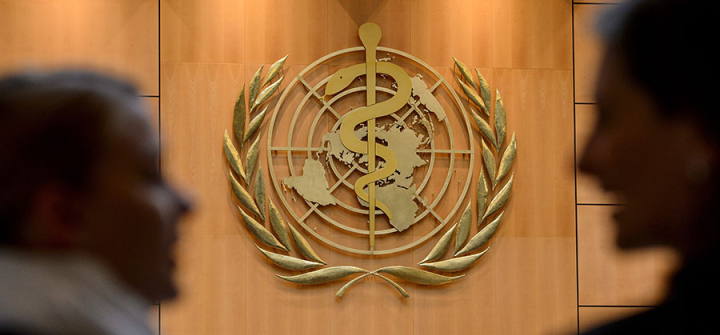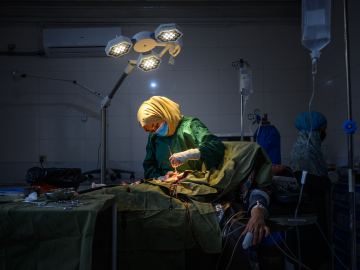7 Things to Watch at the 2019 World Health Assembly—#WHA72
An Ebola outbreak rages. Prices of medicines and vaccines continue to climb skyward. Health care costs force 100 million people into extreme poverty. The globe’s preeminent health organization has been massively reorganized—and needs a new budget.
Delegates to the 72nd World Health Assembly, you have a busy week ahead.
Each year in May, delegates from 194 member states convene to set WHO’s priorities. They’ll have plenty to discuss. Since last year, WHO Director-General Tedros Adhanom Ghebreyesus has advocated for universal health coverage, restructured WHO, proposed a new budget and tackled other major objectives.
His efforts as well as the organization’s current and future work will be scrutinized and discussed (and maybe cussed) in a frenetic 9-day sprint in Geneva. Here are 7 things to watch at #WHA72.
7. Tedros
After almost 2 years on the job as WHO’s Director-General (and a year of global campaigning for the top spot), Tedros is accustomed to the spotlight. Good thing—since all eyes will be on him at WHA.
Last year, his plans for UHC and WHO reform were met with a degree of skepticism, says Jamie Bay Nishi, director of the Global Health Technologies Coalition. To his credit, he and his leadership team have sought out leaders in member states—meeting, for example, with members of the US Congress, she says. Tedros is “not expecting people to come to them. He’s far more forward leaning than that,” she says.
His goals and decisive action have won over many initial skeptics, says Kate Dodson, vice president of Global Health Strategy for the UN Foundation. “I think he is being very well received by lots of different constituencies for creating a big vision and taking forward this really significant transformation of WHO,” says Dodson. “He’s really seeking to make sure WHO is relevant for the future.”
6. Sexual and Reproductive Health and Rights
It’s back. At October’s Global Conference on Primary Health Care in Astana, Kazakhstan, the US tried to strike the phrase “sexual and reproductive health” from the final declaration. (It’s part of a concerted effort by the US State Department, according to Foreign Policy.) Progressive Northern European countries want to reopen that discussion at WHA since they want to ensure that sexual and reproductive health is included in a final UHC resolution that will go UN High Level Meeting in the fall. (More on that later.)
“We believe that discussion will be contentious,” says a Geneva-based source close to the negotiations.
5. Restructure
In March, WHO announced a major revamp of its organizational structure to support its triple billion goals (“one billion more people benefitting from universal health coverage, one billion more people better protected from health emergencies; and one billion more people enjoying better health and well-being.”)
The reorganization is based on 4 pillars: Programmes, Emergencies, External Relations and Governance, and Business Operations. WHO also has a new chief scientist role (filled by Soumya Swaminathan) and a new training effort called the WHO Academy.
“The reorganization is still a big question mark,” says Bay Nishi. “A lot of teams are still going through change. I feel a lot of us are going to try to look under the hood and see how jobs have changed.”`
4. Budget
The 2020-2021 budget that Tedros has proposed looks very different from previous budgets, says Dodson of the UN Foundation. Rather than aligning funds with specific departments, it is oriented toward results. “It has a heavy dose of narrative that rationalizes the impact framework,” Dodson says. “That’s a radical shift.”
As part of his ask, Tedros is seeking not to increase assessed contributions from countries, rather he is asking for more voluntary contributions that are not earmarked for specific uses, says Dodson. This would give him more flexibility in his budget. Sweden’s very flexible contributions are an example.
In addition, Tedros’s team continues to explore establishing a WHO Foundation that would support the organization’s mission. “There’s a sense they have under tapped the ability to generate resrouces from nonstate actors that support their cause,” Dodson says, noting nothing has been finalized and that protections to avoid even the appearance of influence are being figured out.
3. Access to Medicines and Vaccines
A debate on transparency in drug pricing and R&D costs burst into public domain last week. Italy had introduced the resolution on the issue in January, but things got contentious during a May 7 meeting when the US and others made changes to the resolution that weakened it, according to Health Policy Watch. There appeared to be progress toward compromise on May 10.
GHN’s Geneva-based source says Italy will either withdraw the draft resolution for more discussion (as favored by Germany), or it will push forward to force debate on the resolution. “It’s not clear where this will go,” she says. “We expect this item will dominate the assembly.”
The underlying impasse remains between the public health community who want new drugs to be cheap and available, and developed countries like the US, Germany and Japan that support the pharmaceutical industry, says Laurie Garrett, longtime global health journalist and Foreign Policy columnist.
“Access to medicines, of course, that’s always coming up every single year, and every single year, another little Band-Aid passes,” says Garrett. “But that’s not going to fundamentally change the picture.”
2. Ebola/Public health emergencies
After its flawed initial response to the Ebola epidemic in West Africa in 2014, WHO substantially restructured its health emergencies program in 2016. The goal was to not just help countries prepare for crises, but to be a more nimble, front-line player from the start.
The reorganization has been seen as generally successful but will be closely reviewed this year at WHA through the lens of the ongoing Ebola outbreak in the Democratic Republic of the Congo, says Thomas Inglesby, director of the Center for Health Security of the Johns Hopkins Bloomberg School of Public Health.
More than 1,100 people have died in the current outbreak as political instability and violence—including attacks against Ebola treatment centers—have made it nearly impossible for WHO and DRC authorities to stop the epidemic. Cases have been detected in more than a dozen districts. And each time a case pops up in a new location it triggers a cascade of needs from contact tracing and community engagement to treatment infrastructure and vaccine deployment.
“I think these challenges will be the subject of lots of intense discussion,” Inglesby says.
Another key topic: Addressing a funding shortfall for the response that has already caused WHO leaders to raise the possibility of having to roll back its Ebola efforts even as the outbreak continues to grow.
Look for personal reflections on the outbreak from Tedros, who has made repeated trips to the DRC.
1. UHC
There’s no higher priority for Tedros than universal health coverage. He campaigned on it, made it a key part of WHO’s “triple billion” targets and restructured WHO to support its aims.
And this fall, the UN General Assembly will host a High-Level Meeting on UHC. A “draft zero” of the UHC resolution is expected to be released to countries within the next week or so, says GHN’s source close to the negotiations. “The World Health Assembly can’t tell the pen-holders in New York what to do, but they do have a mandate to discuss preparations for the HLM,” she says.
Most member states agree that UHC is important, but the devil is in the dollars. If countries don’t allocate funds for it, the global goal will be a bust. One value of WHA is in persuading member states to publicly state their support for UHC and how much they are willing to spend on it. “We need member states to make a specific commitment in the lead up to the meeting,” says Amy Boldosser-Boesch, who manages the Secretariat for the Civil Society Engagement Mechanism of UHC2030. Then stakeholders, including civil society, can work to ensure governments live up to their commitments.
Ed. Notes: Check out the latest news from #WHA72 here.
Want to share a #WHA72 tip or a story idea, or connect with GHN’s editor-in-chief Brian Simpson in Geneva? Please be in touch.
Join the tens of thousands of subscribers who rely on Global Health NOW summaries and exclusive articles for the latest public health news. Sign up for our free weekday enewsletter, and please share the link with friends and colleagues: Subscribe to GHN
A packed agenda of policy and budget discussions await delegates to this year’s World Health Assembly. Image: Fabrice Coffrini/AFP/Getty, 2012





